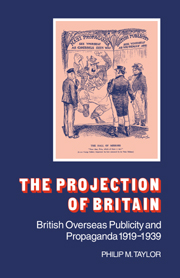Book contents
- Frontmatter
- Contents
- Preface
- Acknowledgements
- Abbreviations
- Introduction
- Part One Publicity and diplomacy, 1919–1939
- Part Two The projection of Britain, 1919–1939
- Part Three Psychological rearmament, 1935–1939
- 5 The BBC foreign-language broadcasts
- 6 The Vansittart Committee for the Co-ordination of British Publicity Abroad
- 7 Propaganda for war
- Conclusion
- Notes
- Select bibliography
- Index
5 - The BBC foreign-language broadcasts
Published online by Cambridge University Press: 01 October 2009
- Frontmatter
- Contents
- Preface
- Acknowledgements
- Abbreviations
- Introduction
- Part One Publicity and diplomacy, 1919–1939
- Part Two The projection of Britain, 1919–1939
- Part Three Psychological rearmament, 1935–1939
- 5 The BBC foreign-language broadcasts
- 6 The Vansittart Committee for the Co-ordination of British Publicity Abroad
- 7 Propaganda for war
- Conclusion
- Notes
- Select bibliography
- Index
Summary
The inadequacies and shortcomings of Britain's somewhat limited conduct of national projection overseas during the 1920s and early 1930s, which were made all the more conspicuous by the progressive escalation of totalitarian propaganda, had resulted in the establishment of the British Council in 1934. This development was significant not simply because of the attempt to rectify some of the deficiencies which had existed in the representation of Britain abroad since the dissolution of the Ministry of Information and Crewe House at the end of the First World War. The British Council was the first genuinely constructive institutional response in Britain to the increasing importance of propaganda as a factor in peacetime international affairs. Moreover, the evidence and arguments which had led to such a development continued to gather force and wider currency during the remaining five years of peace. The subject of propaganda received a measure of consideration, both within official circles and beyond, unprecedented since 1918. The issue was kept alive not only by the continuation of anti-British propaganda but also by repeated questions and debates in the House of Commons, regular attention in the press, numerous articles published in learned journals and the appearance of several books. Nor was it a question of concern merely confined to the lower and middle levels of government administration. Quite the contrary, in fact, for, between 1935 and 1939, propaganda became a recurring topic of high-level and even Cabinet consideration.
Things to come
The political importance of cultural propaganda derived from its long-term aim to make Britain more widely known, understood and appreciated abroad in order to promote British interests and the cause of international peace and co-operation.
- Type
- Chapter
- Information
- The Projection of BritainBritish Overseas Publicity and Propaganda 1919–1939, pp. 181 - 215Publisher: Cambridge University PressPrint publication year: 1981



